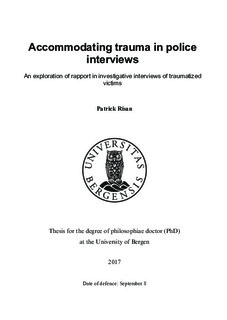| dc.contributor.advisor | Binder, Per-Einar | |
| dc.contributor.advisor | Milne, Becky | |
| dc.contributor.author | Risan, Patrick | |
| dc.date.accessioned | 2017-09-21T07:32:26Z | |
| dc.date.available | 2017-09-21T07:32:26Z | |
| dc.date.issued | 2017 | |
| dc.identifier.uri | http://hdl.handle.net/11250/2455887 | |
| dc.description | Thesis for the degree of philosophiae doctor (PhD) at the University of Bergen | nb_NO |
| dc.description.abstract | In the investigation of a criminal offense, the investigative interview is one of the most important methods used by the police. In interviews, the police investigator may encounter suspects, witnesses or victims who experience a wide range of emotional states: states that may get in the way of rapport and the interviewee providing an optimal account. How can a police interviewer approach an interviewee in order to obtain rapport and attend to his or her psychological needs? The aim of this thesis was to explore the psychological processes underpinning rapport in police interviews of traumatized victims. In three qualitative studies, we examined the processes of developing and maintaining rapport with adult traumatized individuals with an emphasis on how police investigators accommodate the emotional state of interviewees.
The studies reported in Papers 1 and 2 were based on interviews of police investigators responsible for interviewing victims after the Utøya massacre on 22 July 2011 in Norway. We employed an explorative-reflexive approach to these research interviews and used a thematic analysis based on a hermeneutic phenomenological epistemology to examine the data. Paper 1 explored factors considered important and useful for facilitating safety, and for developing and maintaining rapport with traumatized interviewees. The findings showed the importance of the investigator's preparatory efforts through planning and finding an approach, in addition to endeavoring to achieve openness for the interviewee and reflecting on potential emotional reactions that could emerge. The findings highlight the importance of different relational and communicative approaches to enhance rapport, such as a strategic use of first impressions and casual conversation, previewing the interview process, showing understanding, and adapting to the expressions of the interviewee.
One of the main findings presented in Paper 1 was the investigators' descriptions of the significance of managing the interviewee's negative emotions to facilitate safety and thus, rapport. This was the basis for Paper 2, which examined useful approaches to regulating and coping with distress in order to maintain rapport and promote interviewees' psychological well-being. The findings showed the importance of the investigator being attentive to the interviewees' nonverbal communication and his or her capacity to cope with distress before showing acceptance and the ability to handle negative feelings experienced in the interview. To regulate distress, the investigator should respond to the interviewees' emotional needs, help them to feel safe, and promote a positive atmosphere. The findings of Studies 1 and 2 describe different aspects of how police interviewers approach, accommodate, and respond to the state of the interviewee to build rapport and further psychological well-being.
To achieve a further understanding of the emotional processes of police interviews, Paper 3 theoretically examined the concept of emotional intelligence (EI) in investigative interviewing and how EI can be implemented in the training of police interviewers. EI in the context of investigative interviewing was defined, with an emphasis on empathy and emotion regulation. We presented four key considerations for training police interviewers in handling emotions (self-awareness, attention training, communication skills, and emotion regulation) before discussing the usefulness of EI with regard to investigative interviewing.
In summary, the findings demonstrate the importance of police interviewers engaging in relational and emotional processes when interviewing traumatized interviewees. This thesis contributes to the understanding of the underlying psychological processes that facilitate rapport and promote the well-being of traumatized interviewees in police interviews. | nb_NO |
| dc.language.iso | eng | nb_NO |
| dc.publisher | Universitetet i Bergen | nb_NO |
| dc.relation.haspart | Paper I: Risan, P., Binder, P.-E., & Milne, R. (Submitted). Establishing and maintaining rapport in investigative interviews of traumatized victims: A qualitative study. Full text not available in BORA due to publisher restrictions. The article is available at: https://doi.org/10.1093/police/pax031 | nb_NO |
| dc.relation.haspart | Paper II: Risan, P., Binder, P.-E., & Milne, R. (2016). Regulating and Coping With Distress During Police Interviews of Traumatized Victims. Psychological Trauma: Theory, Research, Practice, and Policy, 8(6), 736-744. Full text not available in BORA due to publisher restrictions. The article is available at: http://dx.doi.org/10.1037/tra0000119 | nb_NO |
| dc.relation.haspart | Paper III: Risan, P., Binder, P.-E., & Milne, R. (2016). Emotional Intelligence in Police Interviews-Approach, Training and the Usefulness of the Concept. Journal of Forensic Psychology Practice, 16(05), 410-424. Full text not available in BORA due to publisher restrictions. The article is available at: http://dx.doi.org/10.1080/15228932.2016.1234143 | nb_NO |
| dc.subject | trauma | nb_NO |
| dc.subject | vulnerability | nb_NO |
| dc.subject | sårbarhet | nb_NO |
| dc.subject | investigative interviewing | nb_NO |
| dc.subject | avhør | nb_NO |
| dc.subject | etterforskning | nb_NO |
| dc.subject | criminal offense | nb_NO |
| dc.subject | psychology | nb_NO |
| dc.subject | psykologi | nb_NO |
| dc.subject | psychological processes | nb_NO |
| dc.subject | qualitative studies | nb_NO |
| dc.subject | kvalitativ metode | nb_NO |
| dc.subject | police investigators | nb_NO |
| dc.subject | politi | nb_NO |
| dc.subject | etterforskere | nb_NO |
| dc.subject | Utøya massacre | nb_NO |
| dc.subject | doktorgradsavhandling | nb_NO |
| dc.title | Accomodating trauma in police interviews: An exploration of rapport in investigative interviews of traumatized victims | nb_NO |
| dc.type | Doctoral thesis | nb_NO |
| dc.source.pagenumber | 74 | nb_NO |
